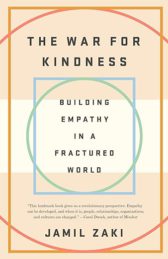Connected communities thrive at every level, and connection is a skill. Jamil Zaki specializes in teaching that skill. Jamil regularly gives keynotes and workshops on the science of human connection to all types of audiences – from K-12 students to Fortune 100 executive teams. He has helped middle schoolers cultivate self-compassion, hospital systems inject empathy into their care, and Fortune 100 companies upskill their workforce to listen more effectively. Jamil believes that “soft skills” can be trained, and has a track record of helping organizations cultivate stronger, more successful cultures through such training.
“Jamil was great, all the comments from our audience indicated that they really loved his talk and session. I saw a few people asking if he would come speak at their company so that’s a bonus! Jamil was fantastic and we had overwhelmingly positive feedback.”

